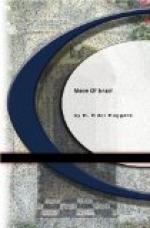Now, listening, I, Ana, thought that Pharaoh would once more be angry. But it was not so, for when he spoke again it was in the voice of one who is crushed by grief or weariness.
“Have your will, Son,” he said. “Only take with you a great guard of soldiers lest these hook-nosed dogs should do you mischief. I trust them not, who, like the Hyksos whose blood runs in many of them, were ever the foes of Egypt. Did they not conspire with the Ninebow Barbarians whom I crushed in the great battle, and do they not now threaten us in the name of their outland god? Still, let the writing be prepared and I will seal it. And stay. I think, Seti, that you, who were ever gentle-natured, have somewhat too soft a heart towards these shepherd slaves. Therefore I will not send you alone. Amenmeses your cousin shall go with you, but under your command. It is spoken.”
“Life! Blood! Strength!” said both Seti and Amenmeses, thus acknowledging the king’s command.
Now I thought that all was finished. But it was not so, for presently Pharaoh said:
“Let the guards withdraw to the end of the hall and with them the servants. Let the King’s councillors and the officers of the household remain.”
Instantly all saluted and withdrew out of hearing. I, too, made ready to go, but the Prince said to me:
“Stay, that you may take note of what passes.”
Pharaoh, watching, saw if he did not hear.
“Who is that man, Son?” he asked.
“He is Ana my private scribe and librarian, O Pharaoh, whom I trust. It was he who saved me from harm but last night.”
“You say it, Son. Let him remain in attendance on you, knowing that if he betrays our council he dies.”
Userti looked up frowning as though she were about to speak. If so, she changed her mind and was silent, perhaps because Pharaoh’s word once spoken could not be altered. Bakenkhonsu remained also as a Councillor of the King according to his right.
When all had gone Pharaoh, who had been brooding, lifted his head and spoke slowly but in the voice of one who gives a judgment that may not be questioned, saying:
“Prince Seti, you are my only son born of Queen Ast-Nefert, royal Sister, royal Mother, who sleeps in the bosom of Osiris. It is true that you are not my first-born son, since the Count Ramessu”—here he pointed to a stout mild-faced man of pleasing, rather foolish appearance—“is your elder by two years. But, as he knows well, his mother, who is still with us, is a Syrian by birth and of no royal blood, and therefore he can never sit upon the throne of Egypt. Is it not so, my son Ramessu?”
“It is so, O Pharaoh,” answered the Count in a pleasant voice, “not do I seek ever to sit upon that throne, who am well content with the offices and wealth that Pharaoh has been pleased to confer upon me, his first-born.”
“Let the words of the Count Ramessu be written down,” said Pharaoh, “and placed in the temple of Ptah of this city, and in the temples of Ptah at Memphis and of Amon at Thebes, that hereafter they may never be questioned.”




